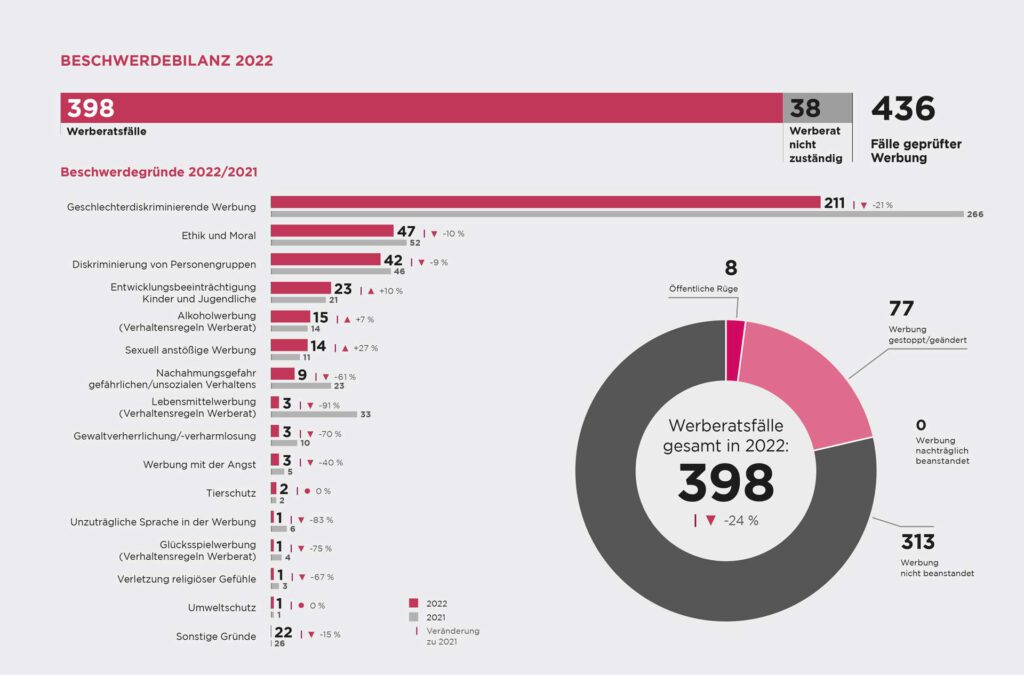EN
English Keyfacts
German Advertising Standards Council
Function
Commercial advertising in Germany is comprehensively regulated by law. The state provides a framework for fair competition and ensures that advertising freedom is not used to the detriment of the public interest – for example by banning advertising claims that mislead, constitute a nuisance or are harmful to minors.
In addition to this statutory regulation, advertisers, the media and advertising agencies themselves actively exercise responsibility for ensuring good standards in advertising. The aim is for the public to have a means of recourse in instances where print, screen or billboard advertisements prompt criticism but do not actually break the law. This purpose is served by Deutscher Werberat – the German Advertising Standards Council. Deutscher Werberat does this in two ways: Firstly, it provides a mechanism for conflict settlement between the public and commercial advertisers. Secondly, it draws up voluntary codes of conduct for advertising, particularly with regard to sensitive areas.
The objective of this form of self-regulation is to promote responsible practices in commercial advertising and to identify and resolve grievances. Deutscher Werberat is highly regarded for its fast and unbureaucratic complaints procedure. The self-regulatory system also has the benefit of being able to respond quickly to emerging developments in the advertising market. The foundation for the work of Deutscher Werberat is its Operating Principles.
Structure
Deutscher Werberat is an institution of the 43 organizations of advertisers, the media, advertising agencies, the advertising professions and research establishments represented by the German Advertising Federation (ZAW).
It is funded by all relevant participants in the advertising market. The ZAW Presiding Committee elects the fifteen members of Deutscher Werberat every three years.
Codes of Conduct
A set of self-regulatory rules on advertising applies for all sectors of industry and all communication channels (offline + online). The advertising industry has also adopted specific sets of rules for a number of sensitive areas. Notable examples include codes on advertisements featuring and targeting children, on personal denigration and discrimination, and on advertisements depicting accident risks.
German Advertising Standards Council – Rules on Advertising and its Appraisal
Code of Conduct on all Forms of Commercial Communication for Foods and Beverages
Code of Conduct on Commercial Communication for Alcoholic Beverages
Explanatory Notes on the Code of Conduct on Commercial Communications for Alcoholic Beverages
Code of Conduct on Commercial Communication for Gambling
Pronouncement of the German Advertising Standards Council on Advertising with celebrities
Complaints Procedure
Complaints are dealt with on the basis of Deutscher Werberat’s rules of procedure. Anyone can submit a complaint on commercial advertising to Deutscher Werberat. Complaints can be submitted by the complaint form, email (werberat@werberat.de), postal mail or fax; anonymous complaints are not processed. Deutscher Werberat can also instigate proceedings itself.
Complainants’ names are treated confidentially and the proceedings are free of charge to the complainant. The advertiser subject to complaint is given an opportunity to respond.
If a complaint is upheld, the advertiser is notified and asked to modify or discontinue the advertisement.
If a breach of the law is suspected, the executive office passes on the case without delay to the responsible authorities – for example the public prosecution service, the Wettbewerbszentrale (Centre of Protection against Unfair Competition) in Bad Homburg, or Integritas (the self-regulatory body for pharmaceutical advertising) in Bonn.
Sanctions
If an advertiser fails to modify or discontinue an advertisement, Deutscher Werberat issues a reprimand and makes the case public: Mass media editorial departments are sent a release on the reprimand which is then reported and commented upon in the press. A public reprimand is rarely necessary: If a complaint is upheld, the advertiser generally complies with Deutscher Werberat’s request to modify or discontinue the advertisement.
Europe
Problems involving cross-border advertising are addressed by the European Advertising Standards Alliance (EASA) based in Brussels (www.easa-alliance.org). This institution, largely founded at the initiative of ZAW, forwards complaints relating foreign advertisements to the national advertising standards authority in the country concerned. Through the EASA, Deutscher Werberat is also in constant exchange with other self-regulatory bodies of the European advertising industry.


